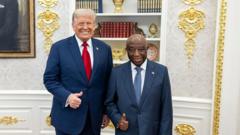Liberia, founded by freed American slaves, maintains deep historical ties with the US, reflected in its culture, language, and significant figures. Here are six crucial insights into this West African nation.
**Understanding Liberia: 6 Key Insights Following Trump's Remarks on President Boakai**

**Understanding Liberia: 6 Key Insights Following Trump's Remarks on President Boakai**
In a recent exchange, President Trump praised Liberia's leader for his "good English," prompting reflections on the country's relationship with the United States.
---
US President Donald Trump sparked a conversation around Liberia's ties with the United States when he used the opportunity to commend Liberian President Joseph Boakai on his proficiency in "good English." Trump’s comments, which included inquiries about the president's educational background, hinted at a potential misunderstanding of Liberia's rich historical context. Below are six significant points that shed light on Liberia’s deep-rooted connection with the US.
1. **Heritage of Freed Slaves**
Liberia was established in 1822 as a settlement for freed African-American slaves, eventually declaring independence in 1847. This initiative had support from figures like former US President Abraham Lincoln, marking significant American influence over Liberia's socio-political fabric. Over a century, the Americo-Liberian population, descendants of these freed slaves, held significant power, leading to tensions with the indigenous community.
2. **Capital Named After A US President**
Monrovia, Liberia's capital city, honors James Monroe, the fifth President of the United States, and is a testament to the structural influence of American culture in the country's architecture and street names, echoing its colonial roots.
3. **Similar Flags**
The design of Liberia's flag bears a striking resemblance to the American flag, featuring alternating stripes and a star that symbolizes its status as the first independent republic in Africa. This visual similarity reflects the historical and diplomatic parallels between the two nations.
4. **American Football Legacy**
Timothy Weah, son of renowned ex-president George Weah, has played for the US national team while also participating in international clubs. This example exemplifies the ongoing blend of American and Liberian identities, particularly in sports.
5. **Nobel Peace Prize Winner**
Ellen Johnson Sirleaf, Liberia's first elected female president and a key figure in the post-civil war rebirth, was awarded the Nobel Peace Prize in 2011 for her efforts in promoting women's rights and fostering stability in the nation. Her education and achievements in the US highlight the cross-cultural influences between Liberia and America.
6. **Dominance of Rubber Production**
The country houses the world’s largest rubber plantation, owned by Firestone Liberia, underscoring the economic dependency on American business interests. Despite its job-creating potential, the company has faced scrutiny over labor practices and human rights issues linked to its operations.
Following Trump’s remarks, reactions in Liberia varied. Some officials, including Foreign Minister Sara Beysolow Nyanti, viewed the comments positively, attributing any misunderstandings to a broader lack of awareness about Africa's linguistic diversity. Others voiced the necessity for deeper global understanding regarding African nations, suggesting Trump's statements may inadvertently highlight misconceptions surrounding the continent.
Overall, Liberia’s story is intertwined with the United States in various aspects, necessitating a recognition of its rich heritage and significant contributions on the world stage—beyond the simplistic viewpoint sometimes presented in international dialogue.
US President Donald Trump sparked a conversation around Liberia's ties with the United States when he used the opportunity to commend Liberian President Joseph Boakai on his proficiency in "good English." Trump’s comments, which included inquiries about the president's educational background, hinted at a potential misunderstanding of Liberia's rich historical context. Below are six significant points that shed light on Liberia’s deep-rooted connection with the US.
1. **Heritage of Freed Slaves**
Liberia was established in 1822 as a settlement for freed African-American slaves, eventually declaring independence in 1847. This initiative had support from figures like former US President Abraham Lincoln, marking significant American influence over Liberia's socio-political fabric. Over a century, the Americo-Liberian population, descendants of these freed slaves, held significant power, leading to tensions with the indigenous community.
2. **Capital Named After A US President**
Monrovia, Liberia's capital city, honors James Monroe, the fifth President of the United States, and is a testament to the structural influence of American culture in the country's architecture and street names, echoing its colonial roots.
3. **Similar Flags**
The design of Liberia's flag bears a striking resemblance to the American flag, featuring alternating stripes and a star that symbolizes its status as the first independent republic in Africa. This visual similarity reflects the historical and diplomatic parallels between the two nations.
4. **American Football Legacy**
Timothy Weah, son of renowned ex-president George Weah, has played for the US national team while also participating in international clubs. This example exemplifies the ongoing blend of American and Liberian identities, particularly in sports.
5. **Nobel Peace Prize Winner**
Ellen Johnson Sirleaf, Liberia's first elected female president and a key figure in the post-civil war rebirth, was awarded the Nobel Peace Prize in 2011 for her efforts in promoting women's rights and fostering stability in the nation. Her education and achievements in the US highlight the cross-cultural influences between Liberia and America.
6. **Dominance of Rubber Production**
The country houses the world’s largest rubber plantation, owned by Firestone Liberia, underscoring the economic dependency on American business interests. Despite its job-creating potential, the company has faced scrutiny over labor practices and human rights issues linked to its operations.
Following Trump’s remarks, reactions in Liberia varied. Some officials, including Foreign Minister Sara Beysolow Nyanti, viewed the comments positively, attributing any misunderstandings to a broader lack of awareness about Africa's linguistic diversity. Others voiced the necessity for deeper global understanding regarding African nations, suggesting Trump's statements may inadvertently highlight misconceptions surrounding the continent.
Overall, Liberia’s story is intertwined with the United States in various aspects, necessitating a recognition of its rich heritage and significant contributions on the world stage—beyond the simplistic viewpoint sometimes presented in international dialogue.



















